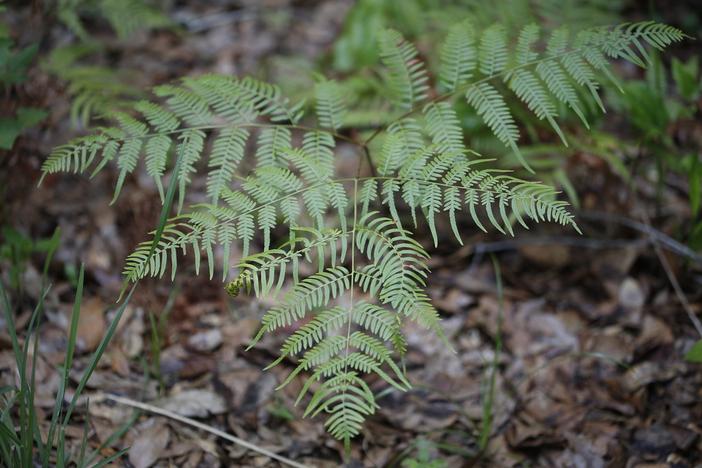Western Brackenfern
(Pteridium aquilinum subsp. pseudocaudatum)
Western Brackenfern (Pteridium aquilinum subsp. pseudocaudatum)
/
/

Carol VanHook
CC BY-SA 2.0
Image By:
Carol VanHook
Recorded By:
Copyright:
CC BY-SA 2.0
Copyright Notice:
Photo by: Carol VanHook | License Type: CC BY-SA 2.0 | License URL: https://creativecommons.org/licenses/by-sa/2.0/ | Uploader: vanhookc | Publisher: Flickr

Estimated Native Range
Summary
Pteridium aquilinum subsp. pseudocaudatum, commonly known as Western Brackenfern, Bracken Fern, Tailed Bracken, or Eagle Fern, is a perennial fern native to a variety of habitats including open woodlands, heathland, moorland, and hill pastures across the southeastern United States. It is a robust plant, often forming large colonies, and can grow rapidly to a height of 2.5-3 feet (0.8-0.9 meters). This fern is characterized by its large, highly divided leaves that can create a dense canopy over the ground. The fronds are triangular and can be quite large, contributing to its dominance in some landscapes. It does not produce flowers, but its spores are found on the underside of the fronds and are released in summer.
Western Brackenfern is valued for its ability to cover large areas, making it useful for erosion control and as a ground cover in spacious garden settings. It is also appreciated for its lush green appearance and its adaptability to a range of soil types. In cultivation, it thrives in full sun to part shade and prefers medium or fast-draining clay, loam, or sandy soils with medium water requirements. However, gardeners should be cautious as it can become invasive outside its native range, often outcompeting native vegetation. Additionally, all parts of the plant are toxic to livestock and humans if ingested in large quantities, and it has been associated with certain types of cancer in animals.CC BY-SA 4.0
Western Brackenfern is valued for its ability to cover large areas, making it useful for erosion control and as a ground cover in spacious garden settings. It is also appreciated for its lush green appearance and its adaptability to a range of soil types. In cultivation, it thrives in full sun to part shade and prefers medium or fast-draining clay, loam, or sandy soils with medium water requirements. However, gardeners should be cautious as it can become invasive outside its native range, often outcompeting native vegetation. Additionally, all parts of the plant are toxic to livestock and humans if ingested in large quantities, and it has been associated with certain types of cancer in animals.CC BY-SA 4.0
Plant Description
- Plant Type: Fern
- Height: 2.5-3 feet
- Width: 4-6 feet
- Growth Rate: Rapid
- Flower Color: N/A
- Flowering Season: Non-Flowering
- Leaf Retention: Deciduous
Growth Requirements
- Sun: Full Sun, Part Shade
- Water: Medium
- Drainage: Medium, Fast
Common Uses
Deer Resistant, Erosion Control, Low Maintenance
Natural Habitat
native to a variety of habitats including open woodlands, heathland, moorland, and hill pastures across the southeastern United States
Other Names
Common Names: Bracken Fern, Tailed Bracken, Eagle Fern
Scientific Names: , Pteridium aquilinum subsp. pseudocaudatum, Filix-foemina aquilina var. pseudocaudata, Pteridium aquilinum var. pseudocaudatum, Pteridium aquilinum var. pseudocaudatum, Pteridium latiusculum var. pseudocaudatum, Pteridium pseudocaudatum, Pteris aquilina var. pseudocaudata, Pteris latiuscula var. pseudocaudata, Pteris pseudocaudata, 1901,
GBIF Accepted Name: